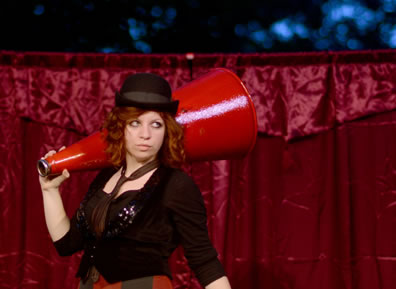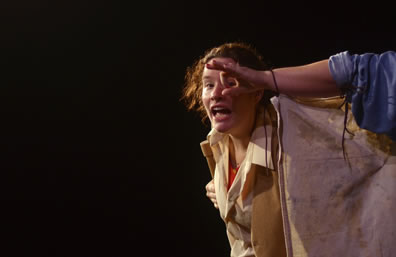A Midsummer Night’s Dream
Nature Joins a Circus of Fairies
For a Singular Dream
Clever By Half Productions, Oak Grove Theater, Verona, Va.
Sunday, September 16, 2012, General Admission (center of amphitheater)
Directed by Christina Scott Sayer Grey
I’m not sure whether to start with “hoity-toity” or “you acorn.” Both were spoken—one in the audience, one on stage—at the final showing of Clever By Half’s A Midsummer Night’s Dream, and both go to the heart of what makes live theater such a singular art form, in and of itself and within itself, too. I’ll start with one and go to the other in recounting our pleasant afternoon at the rustic outdoor Oak Grove Theater in the Shenandoah Valley.

Carmel Clavin as Puck in the Clever By Half production of A Midsummer Night's Dream at the Oak Grove Theater. Photo by Pat Jarrett, Clever By Half Productions.
Clever by Half, begun in 2005, produces murder mystery theater, hired out for conventions, parties, and other private events, and performs weekly murder mysteries at Massanutten Resort near Harrisonburg, Va. The company scripts new scenarios every year and currently has a repertoire of six murder mysteries. Additionally, Clever By Half supplies actors to present characters at various events, produces a theater for young audiences, and, occasionally, stages an early modern play, i.e., Shakespeare.
For its Shakespeare plays, Clever By Half uses the 175-seat Oak Grove Theater, the 59-year-old home to a summer stock company and folk music festival on the outskirts of Verona. The stage is a wooden platform in an amphitheater setting not only surrounded by tall oaks but with one sturdy tree rising up through the stage itself. “Backstage,” as it were, is down the hill behind the stage, and patrons are advised to bring bug spray and beware of falling acorns.
Some of those patrons for the Sunday show were Oak Grove devotees carrying on casual conversation with people new to the experience. One of the Oak Grove old-timers described the Shenandoah Shakespeare Express, the touring company that would evolve into the American Shakespeare Center now based at the Blackfriars Playhouse in Staunton about six miles down U.S. Highway 11. “They’re all hoity-toity now,” the man said of the ASC. Another man later said he preferred the Clever By Half’s performances of Shakespeare because “you can understand what they’re saying better” than those at the Blackfriars.
I found both opinions surprising and ironic. Surprising, because I’ve long considered ASC’s actors to be among the best elocutionists of Shakespeare anywhere (London included), and though they present text-centric Shakespeare, they make it mighty entertaining with audience participation, modern music, and clever sight gags: I would never consider them hoity-toity. However, I long ago learned that perception of hoity-toity is a two-way street, and the Oak Grovers’ comments may be a case of reverse snobbery in that they consider their, frankly, less-polished Shakespeare superior to others’ by virtue of its being less polished. Whatever the polish, I was certainly enjoying this Midsummer Night’s Dream. So, too, were members of the ASC touring troupe who were in the audience. That’s the irony in the first man’s comment: Not only were some of the hoity-toity members of ASC here at Oak Grove, but some of the principals in Clever By Half are on the ASC staff, and a couple have been members of acting companies at the Blackfriars.
Good Shakespeare is good at any level. The patrons’ comments, in fact, point to not only the accessibility but also the value of Shakespeare on all levels, from middle school to college productions, from amateur community theaters to Equity theaters with royal patronage. Certainly, some stagings do not have the caliber of acting and production skills that others have, but wealth of resources does not necessarily translate into value, and if we’d all set aside our premeditated snobbery, we’d all be richer. This is the 15th production of A Midsummer Night’s Dream that I’ve seen in my life. It’s not the best (that honor still goes to one I saw at the Atlanta Shakespeare Tavern) nor is it the worst (a rather desultory Royal Shakespeare Company production holds that distinction, though as I scan my list of productions I have absolutely no recollection of three Dreams I’ve seen). It is, however, its singular self and is of immense value for being so.
Director Christina Scott Sayer Grey translates the fairies into a classic traveling carnival. Oberon (Natasha Solomon) is the ringmaster, Titania (Leigh Ellis) a tightrope walker. Moth (Rachel Belleman) is a fortune teller, Peaseblossom (Jennifer LaFleur) the tattooed lady, Cobweb (Shane Sczepankowski) a harlequin-like clown, and Mustardseed (Dylan Grey) a strong man, complete with leopard skin mantle. Carmel Clavin plays Puck as the carnival barker, whose megaphone has some magic properties. This is Puck with an attitude, petulantly carrying out Oberon’s orders. He has little regard for romanticism; when it comes to matters of the heart, all he cares about is the conflict it creates, such as Oberon making his queen falsely dote on a man with an ass’s head, and the pairs of Greek lovers brawling over temporal lust. The carnival characters do not actually carry out circus stunts, but in their costumes and movements they portray an otherworld that we can easily access, a mix of humanity and magical properties that Shakespeare’s fairies embody. Clavin, without changing costume or persona, serves as Philostrate, too, Theseus’ master of revels. It’s an interesting blending of characters.
The other characters are more straightforwardly rendered, but yet we were treated to some unusual interpretations. Shannon Schultz is a most intelligent Helena; at times she seems too intelligent to fawn so much (and with so little self-respect) on the spotted and inconstant Demetrius (Ben Ratkowski). On the other hand, such a bookish Helena would not necessarily be able to grasp the illusive attributes of true love nor have the social acumen to, say, realize the folly of ratting on Lysander’s and Hermia’s flight. Besides, it’s pure fun watching Schultz working through Helena’s thought processes with such concentrated logic. She even makes the spaniel sequence a logical progression that results in us laughing at the joke rather than pitying the woman.
Sczepankowski doubles as Francis Flute, who takes his thespian career seriously. He tries to bring a dramatic baritone voice to his Thisbe, but finally manages to make his false soprano sound dramatic enough to induce tears from Peter Quince (John Michael Schott). Sczepankowski found in Flute a jealousy of Bottom, and his put-upon reactions to the weaver’s showing off is out-loud funny (to carry off this interpretation, Sczepankowski gives an ironic reading to Flute’s describing Bottom as having “simply the best wit of any handicraft man in Athens”). Katelyn Murray is an immensely self-confident Bottom. We half-believe he really does have the acting talent he claims to have (until we see it in action), and when he auditions for the lion’s part by roaring “as gently as any sucking dove,” Murray performs a most incredible coo of a roar (or roar of a coo, I’m not sure which) that I wanted to say, “Let him roar again, let him roar again!” Grey doubles as the shy Snug apprehensively playing the lion, and earns multiple points for cuteness alone.

Bottom (Katelyn Murray) playing Pyramus peers through the chink in the Wall, played by Tom Snout (Rachel Belleman) in the Clever By Half production of A Midsummer Night's Dream at Oak Grove Theater. This Bottom's acting inspired jealousy in Shane Sczepankowki's Frances Flute. Photo by Pat Jarrett, Clever By Half Productions.
It might have been my own imagination, but I wondered if this Theseus (Noah McBrayer Jones) saw deeper into the lovers’ dilemma than any other Theseus I’ve seen. I got the impression that not only does he whisk away Egeus and Demetrius to give Lysander and Hermia time alone, but he also prods the latter into flight. His lines, “For you, fair Hermia, look you arm yourself to fit your fancies to your father’s will, or else the law of Athens yields you up—which by no means we may extenuate—to death or to a vow of single life,” could have a winking tone to it, with the emphasis shifted from “father’s will” to “your fancies” and thereby giving a dubious meaning to “arm yourself.”
Such shadings, real and imagined and in varying degrees, is why live theater, and live Shakespeare in particular, is such a dynamic art form. While this Dream is no better nor no worse than most of the previous 14 I've seen, it was its own special experience for the way the director shaped the characters and the actors played their parts.
Live theater has another dynamic that no other art form (save for live music) has: an in-the-moment tension that comes about precisely because it is live. This feature is amplified in an outdoor theater where natural elements sometimes intervene in a performance. Throughout A Midsummer Night’s Dream, acorns dropping from the tall oaks ricocheted like rifle fire off nearby roofs and branches, and one bounced on the seat behind us. Nature can have a wicked sense of humor, and so we got the once-in-a-lifetime treat of seeing Lysander (George Dippold) rounding on Hermia (Cass Morris) with “Get you gone, you dwarf, you minimus of hind-ring knot-grass made! You bead, you acorn,” and on cue an acorn crashed down at Hermia’s feet. Dippold and Morris looked down in surprise; but, without breaking character, Lysander nodded as if nature herself had just punctuated his point, and Hermia spread her anger to include not just the two men and Helena but the tree growing through the stage, too, from whence that acorn fell.
Such was A Midsummer Night’s Dream at the Oak Grove Theater this Sunday afternoon. There had never been nor will ever be another like it, but we have our fond memories of this one to treasure.
Eric Minton
September 19, 2012
Comment: e-mail [email protected]
Start a discussion in the Bardroom



 Find additional Shakespeareances
Find additional Shakespeareances